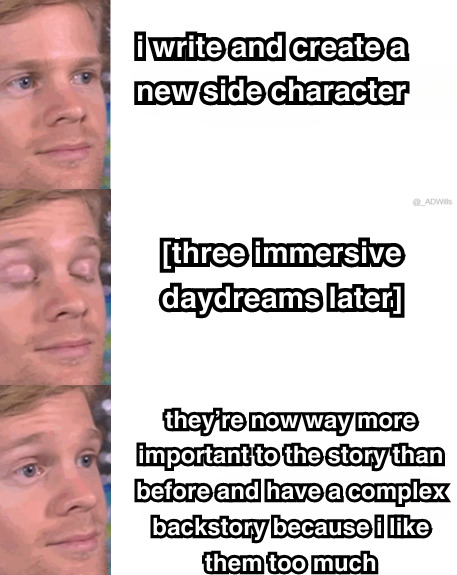Text
Writing Software I Use & Recommend
Brainstorming:
Campfire: Great for organising your thoughts and making detailed character profiles, customised maps, worldbuilding, plot organisation—amongst other features. You can write your manuscript here and post it; and they have many helpful writing tips on their blog. Here's a general overview (customisable):
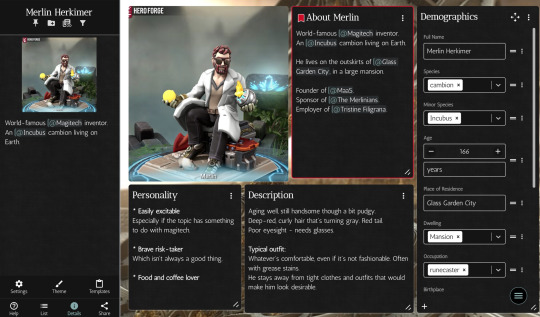

Notion: Although not conventionally a writing software, I find it immensely helpful for getting my thoughts sorted out. It's organised and easy to navigate, and the interface is manageable and uncluttered. (Keep in mind it's hard to cowrite on Notion—if you're planning to, I suggest making a separate Gmail account and both logging in with that.)
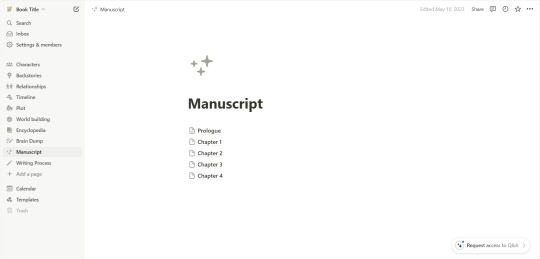
Microsoft Word, with spellcheck off, in Comic Sans (I saw the font thing somewhere and hate that it works). This is what I use when writing excerpts or spontaneous ideas, and it's actually quite effective, though I couldn't tell you why.
Writing/Editing:
Reedsy: The manuscript editor is organised and lets you set writing goals, split chapters, and jot down notes for later. I highly recommend it for authors looking to self-publish—once you're done, you can format and export your book as an eBook or PDF; and you can connect with various editors and find the one that's right for your novel.
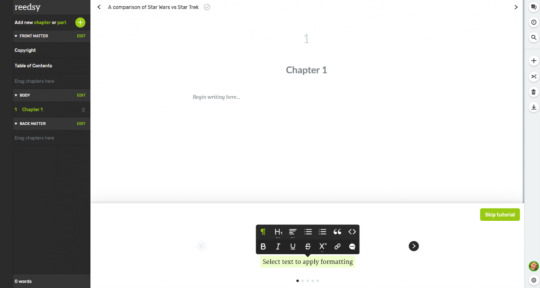
Scrivener: Although, unlike the others I've mentioned so far, this software isn't free, the formatting is great for making an outline, collecting any research and notes, and writing your manuscript.
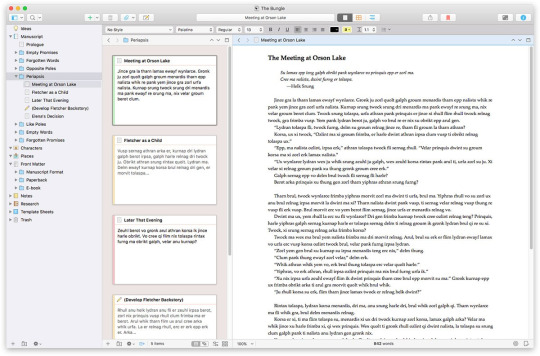
Feel free to add on any more you know of! Hope this was helpful ❤
653 notes
·
View notes
Text
“omg you’re so creative. how do you get your ideas” i hallucinate a single scene in the taco bell drive thru and then spend 13 months trying to write it
56K notes
·
View notes
Text
Let's talk about writing fantasy.
Fantasy is one of my favourite genres, to read and to write. But the worldbuilding required and the existing tropes can make it difficult to craft a unique, compelling novel. There are a number of less-discussed nuances that might not always be at the forefront of writing discussions. Here are some tips to help you out:
Ground it in reality: Even though fantasy allows for boundless imagination, grounding your world in elements familiar to readers can make it more relatable and believable. Making it too otherworldly can make it difficult to understand or follow, and will likely make it much more difficult to interweave the explanation of your world and its society into the text seamlessly.
Consistency: Fantasy worlds can be complex, with their own rules, magic systems, and histories. Ensure consistency in your worldbuilding, avoiding contradictions or sudden changes without explanation. I find it helpful to keep a world bible or notes to track details and maintain coherence throughout the story.
Character-driven plots: While epic battles and magical quests are exciting, don't forget that compelling characters drive the heart of any story. Develop multi-dimensional characters with strengths, weaknesses, and personal arcs that resonate with readers (see my post on character development for more).
Avoid clichés and stereotypes: Fantasy often draws from familiar tropes and archetypes, but try not to rely on them too heavily. Subvert expectations and breathe new life into old conventions by adding unique twists or exploring lesser-known mythologies and cultures. Make it your own!
Magic has consequences: Magic adds wonder to fantasy worlds, but it should also have limitations and consequences. Consider the societal, environmental, and personal impacts of magic on your world and characters. A well-defined magic system can enhance the depth and realism of your story.
Worldbuilding through storytelling: Instead of dumping large chunks of exposition, reveal your fantasy world gradually through character interactions, dialogue, and plot progression. Show, don't tell, and let readers piece together the intricacies of your world as they journey through your story (check out my previous post on worldbuilding for more tips).
Embrace diversity: Fantasy worlds should reflect the diversity of our own world. Include characters from various backgrounds, cultures, and identities, and explore themes of inclusivity and acceptance within your narrative.
Conflict beyond good vs. evil: While the battle between good and evil is a classic fantasy trope, consider adding layers of moral ambiguity and complexity to your conflicts. Explore themes of power, redemption, and the consequences of choices made in the face of adversity.
Research is essential: Even in a world of imagination, research plays a crucial role in grounding your story in reality. Whether it's drawing inspiration from historical events, cultural practices, or scientific principles, thorough research can enrich your worldbuilding and add depth to your narrative. Even fantasy worlds and elements require some sort of basis to make them more believable.
Revise: Like any genre, writing fantasy requires extensive revision and polishing. Be prepared to revise your manuscript multiple times, seeking feedback from beta readers or critique partners to strengthen your story, characters, and worldbuilding.
Happy writing!
526 notes
·
View notes
Note
Could you maybe write some prompts for portraying an unreliable narrator?
How to Write an Unreliable Narrator
-> 8 Tips to Writing Unreliable Narrators - Writer's Digest
make them a liar. Have them commit their faults outright, contradict themselves in the narrative, prove them to be a liar by their actions, have them hint that they know more than they're telling, reveal the truth a little later than they should, or have gaps in their memory.
shift their motives. Give your character conflicting desires and changing drives. Keep your reader guessing about their true mindset. (Are they in love with Character B? Or are they obsessed with Character B? Do they want to help B, or do they want to harm B?)
make them more clever than they appear. Have your reader believe your character is innocent and incapable of cunning and calculating schemes. Maybe they appear innocent and naive to the reader, and only later it is revealed that their childish actions have purpose.
use your secondary characters. Have them catch your narrator in lie, reveal that they are a victim of your narrator's lie, reveal a truth that the narrator has yet to share with the reader. How they treat the narrator can also show their unreliability. Sharing personal histories with the narrator may expose a side to the narrator that the reader hasn't seen.
add an unpredictable act. When a calm, thoughtful, innocent character suddenly does something out of character and a little unhinged, they become unreliable. (ex: a grieving woman suddenly throws all of her husband's belongings in the lake.)
4 Types of Unreliable Narrators:
-> What Is an Unreliable Narrator? - MasterClass
Picaro. The picaro is a character who has a knack for exaggerating.
Madman. The madman is unreliable because they are mentally detached from reality.
Naif. The naif’s narrative abilities are impacted by inexperience or age.
Liar. The liar is the most deliberate of all the unreliable narrators. The character fabricates stories, often to paint a better picture of themselves or achieve a desired outcome.
If you like what I do and want to support me, please consider donating! I also offer editing services and other writing advice on my Ko-fi!
1K notes
·
View notes
Text
The Character Arc: 101
As opposed to the plotline, the character is a description of what ahppens to the inside of the character over the course of the story.
Your lead character should be a different person at the other end of the arc.
The character has a build to it. It must, or the change will not be convincing. A good character arc has:
A beginning point, where we meet the character and get a sense of his interior layers (more on layers in a moment)
A doorway through which the character must pass, almost always reluctantly
Incidents that impact the layers
A deepening disturbance
A moment of change, sometimes via an "epiphany"
An aftermath
Layers of a Character
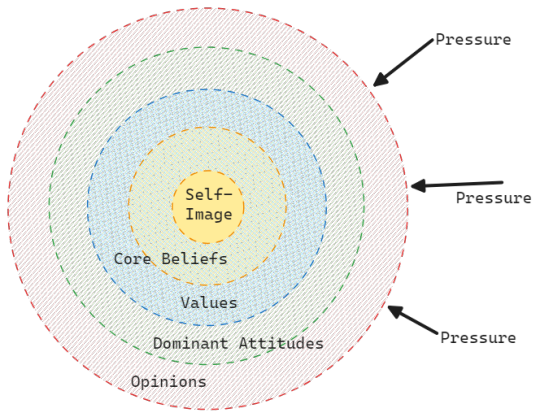
The layers get "softer" (easier to change) as you move outward. The point of the whole character arc is to crack these layers one by one with external pressure until the character changes in a major way.
As an example: Scrooge from <A Christmas Carol>?
Core Image = miser, misanthrope
Beliefs = pointlessness of charity
Values = money over people
Attitude = profit is more important than good works
Opinion = christmas is a humbug
The Beginning = The character is, well, what he usually is.
Impacting Incidents = There's pressure for the character to change.
it is best to underplay such moments.
Overdo it, and you will lapse into melodrama.
Deepening Disturbances = The initial "lesson" is followed up by an even more shocking pressure
Aftermath = There is an action which indicates that the character is changing, reacting to the external pressure.
The Epiphany = The big moment of change.
The Character Arc Table
List the impacting and deepening incidents in your novel in a table
Add the first (starting) and last (ending) points of your plot
Now, list how your character's inner world changes along with the external changes that take place.
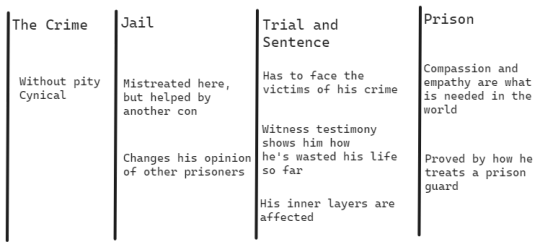
If you like my blog, buy me a coffee☕ and find me on instagram! 📸
2K notes
·
View notes
Text
Let's talk about pacing.
Pacing is crucial to consider in plot development. It refers to the speed at which events unfold in your story.
It's important to vary the pacing to keep readers engaged. By effectively managing it throughout, you can maintain reader interest, build tension, and create an overall compelling narrative.
Fast-paced scenes: Use quick, action-packed scenes during moments of high tension, such as intense action sequences or pivotal plot points. Short sentences and rapid-fire dialogue can help create a sense of urgency and keep readers on the edge of their seats.
Slow-paced scenes: Slow down the pacing during moments of introspection, character development, or when you want to build atmosphere. Take the time to delve into emotions, descriptions, and inner thoughts to deepen the reader's connection to the characters and world.
Transitions: Smoothly transition between fast-paced and slow-paced scenes to maintain momentum while allowing readers time to catch their breath and process information. (See here for more on how to effectively implement transitions!)
Avoid prolonged lulls: While it's essential to have slower moments for character development and world-building, be cautious of prolonged lulls in the story where nothing significant happens. Keep the plot moving forward, even during quieter scenes, by introducing new information, conflicts, or character dynamics.
Balance: have a balance between fast-paced and slow-paced scenes throughout your narrative to create a dynamic reading experience. Too much action without sufficient downtime can exhaust readers, while an excessive number of slow scenes may lead to boredom.
More writing help on my blog! ❤
2K notes
·
View notes
Text
WORLD BUILDING CHECKLIST
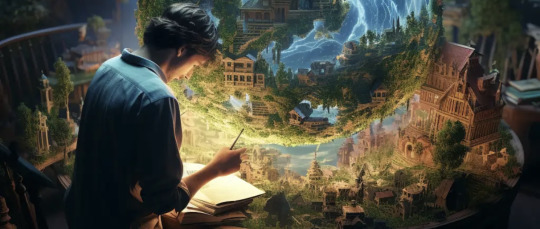
If you are writing a book/story that takes place in another world, I have provided for you the complete world building checklist to ensure that you know your world inside out.
Economy
A. Currency
B. Poverty rate/line
Government
A. Crime & Legal System
B. Foreign Relations
C. Politics
D. War
The Land
A. Physical & Historical Features
B. Climate
C. Geography
D. Natural Resources
E. Population
Society & Culture
A. Arts, Entertainment, & Recreation
B. Architecture
C. Calendar
D. Daily Life.
E. Diet
F. Ethics & Values
G. fashion & Dress
H. History
I. Dining Customs
J. Education
K. Language
L. Gestures
M. Manners
N. Meeting & Greeting
O. Religion & Philosophy
P. Social organization
Magic
A. Magicians
B. Magic and science
C. Magic & Technology
D. Rules of Magic
Technology
C. Technology
D. Medicine
D. Transportation & Communication
you're welcome <3
Fell free to reblog and fill it out if you want. I am curious to see the worlds in my fellow writers heads.
Follow me @leisureflame for more posts like this!
4K notes
·
View notes
Text
NEED HELP WRITING? (a masterlist)
I have likely not added many that I've reblogged to this list. Please feel free to roam my blog and/or ask/message me to add something you'd like to see on this list!
Synonym Lists
Look by @writers-potion
Descriptors
Voices by @saraswritingtipps
Show, Don't Tell by @lyralit
Tips & Tricks
5 Tips for Creating Intimidating Antagonists by @writingwithfolklore
How To (Realistically) Make a Habit of Writing by @byoldervine
Let's Talk About Misdirection by @deception-united
Tips to Improve Character Voice by @tanaor
Stephen King's Top 20 Rules for Writers posted by @toocoolformedschool
Fun Things to Add to a Fight Scene (Hand to Hand Edition) by @illarian-rambling
Questions I Ask My Beta Readers by @burntoutdaydreamer
Skip Google for Research by @s-n-arly
Breaking Writing Rules Right: Don't Write Direct Dialogue by @septemberercfawkes
Databases/Resources
International Clothing
Advice/Uplifting
Too Ashamed of Writing To Write by @writingquestionsanswered
"Said" is Beautiful by @blue-eyed-author
9K notes
·
View notes
Text
Writing Tip: Identifying Your Unique Style
When it comes to writing styles, understand what works for others might not work for you and vice versa. Now, when it comes to writing, the first thing we want to do is get the basics down. That's crucial. But once you have that, you might be wondering how far you have to go when it comes to your style of writing? Now, we've talked about always striving to do better, but another thing to understand is remember to find a style you are comfortable with.
I write very descriptive, I like to use metaphors and similes a lot. Does that mean you need to as well? Not at all. It's my style of writing, it's what works for me. Don't look at other writers' material and feel like you need to replicate their standards. Find a style you are comfortable with. Find what works for you. This isn't just something to remember in writing but in life itself.
138 notes
·
View notes
Text
The First Thing You Learn in University Creative Writing Classes
I was very fortunate to major in Creative Writing when I went to college. It was a great experience, but I remember being so nervous when I walked into my first class as a freshman.
I'd been writing stories since elementary school, so I worried that this first class would teach me something wildly different than what I knew about writing. Maybe there was some secret formula to creating characters or mental exercises that immediately dissolved writer's block that you could only learn from a professor.
When my first class ended, I was shocked.
The first thing you learn in a university-level creative writing class?
Read more than you write.
It's that simple. I thought my professor had lost his mind, but the many others that followed always echoed the advice.
The advice then saved my ability to write when I was getting through each day during some of the hardest times of my life.
Pick up the good books. The great books. The terrible books that make you quit reading them because they're so bad.
They will all make your writing stronger.
You'll learn how to write fantastic characters, weave plot lines, and paint worlds with words. You'll also learn what you don't like in someone's writing so you can avoid it in your own.
Even during the periods when I wrote nothing at all, reading kept that love for writing alive in my heart.
It's the best way to reconnect with that passion if you've lost it and the greatest way to develop that skill.
Read more than you write.
Your storylines and characters will thank you later.
4K notes
·
View notes
Text
You have one super power: The ability to know without fail what the truth is to any asked question. You planned to help the world as a super hero. It took you six hours for the government to declare you public enemy number one and the most deadly super villain alive.
17K notes
·
View notes
Text
Freelance Writing: A Beginners Guide

So, you're certifiably crazy and you want to throw caution, and financial stability to the wind in pursuit of a career as a freelance writer... if this sounds negative, don't be put off. It's just my way; it's possible to make a good living as a freelance writer. I should know, I did it for nearly ten years, first as a part-time 'side hustle' then full-time as a copywriter.
It's a good life, I certainly enjoyed it, but I'm not going to bullshit you; it's hard work. It's uncertain. It requires stamina, flexibility, and the ability to take shit from people who are often demanding, at best, or downright unreasonable at worst. I've decided to make a change, but as I slip out of this life and into another I've decided to consolidate what I know about the business and send it out into the world.
So, lets start from ground zero. You know how to write, you're confident enough in your skills to seek out employment in the field. I'm here to help you side step the major pitfalls and increase your chance of getting work. Read More
46 notes
·
View notes
Text
How to write smut scenes
Some personal tips i use for writers who want to set fires to the loins of their readers: (nsfw content)
For starters, define your end goal and drive of your smut.
Every writing must have a drive. Every character has an intention. No, I'm not talking about only the plot, and yes, even PWP needs it. Your scene can start in the midst of the action but must still contain the purpose.
Ask yourself why are the characters fucking? Does one character want to show their love to the other? Or are they seeking their own pleasure? Your characters' dynamic can be the drive. If you have kinky undertones, that can be your drive too.
What this does is that make the scene spicy, stake up the tension and give gratification to readers when the goal is reached.
Point of view
I said it before and i will say it again: No head hopping! Smut is a very intimate scene in which we dive deep into the character's feelings, emotions and entirely focused on their sensations.
You make readers feel the sensation of your first character then show outward reactions of your other character(s). So carefully choose whose pov you wanna write. If you need to change the pov, take a scene break, then switch.
How to absorb your readers into the action?
There's a simple technique called "being in your prime character's head" and this is how you do it.
Instead of writing this:
The air in the room was cold but the florescent light overhead was warm.
You write:
Goosebumps broke out on A's arms against the brisk air of the room while the warmth of the florescent light overhead heated his flushed skin furthermore.
An active tone example:
A shivered against the streep contrast of the cold night air and their flushed skin under the warm florescent light.
The beauty of pacing
If your foreplay is nicely detailed but the main course lasts for like two paragraphs, the satisfaction aint gonna be it, bestie. (Or you intentionally want it short, then oke you do you boo)
One of my favorite pacing techniques is carrying out the actions through dialogues. It keeps the characters dynamic and adds variables to the sentences while pushing the motion.
How to lengthen your smut scene:
The writing feels bland? Add sultry words.
Don't know many variations of sex movements? Use implications! You don't need to describe every thrust. Write about the noise, the rhythm, the bed moving, heart fastening, thighs quivering, breath getting haggard etc.
The scene feels too action oriented? Let your characters talk! Break it up with dialogues! Dirty talking is your condiment.
You don't wanna write long scene but want it to feel like it is long and properly paced? Change positions.
Don't know how to get in the mood? Watch porn (not only to enjoy it) and try to narrate what's happening in your head. It is a useful exercise, if you're comfortable.
Literally don't know what to add? Read smuts and take examples.
Well, that's it, folks! If you have any questions, feel free to hit up my ask, and i will walk you through it, bestie.
Happy writing!
312 notes
·
View notes
Text
Unlock Your Emotional Blocks to Start Writing Again
Writer's block posts often focus on how to tackle whatever's stopping your creativity. It's often about changing your surroundings or reading new books.
Those resources can be incredibly useful, but I've found more help recently by asking myself this question:
What's been going on with my emotions since the block started?
Sometimes we go through things where we have to box our emotions away. It's a survival strategy and one we often learn when we're so young that it becomes an instinct.
The hard part is that tough situations don't stop happening. There can be long breaks in between and varying levels of hardship, but when they return, you might stop yourself from feeling the full weight of your sadness, anxiety, panic, hurt or whatever else it triggers in your heart.
Creativity correlates with our emotions. If we can't feel them, we're going to have writer's block.
Ask yourself if you've been processing any heavy emotions lately or even avoiding them.
Journal about it either way
Talk with a therapist
Vent to a loved one
(If you're into psychology, EMDR and binaural beats can unlock that hidden part of your brain too.)
While you do, pay attention to your physical sensations. They can indicate your underlying or blocked emotions before you feel them.
Ask what each sensation is trying to tell you. Sit with that feeling. Let it flow through your body. Follow it to the next sensation or emotion it brings up.
Set a timer so you don't get too lost in your feelings. Give yourself some self-care afterward.
Your writing will likely come back when your subconscious isn't actively blocking your emotions.
253 notes
·
View notes
Note
I've read your post on manipulative characters, and it helped a lot! Could you explain how to write manipulated characters?
Creating a character who is under the influence or control of another is a challenging feat for any writer. To effectively portray this dynamic, it’s crucial to understand the manipulator’s goals and the methods they use to exert their influence. Let’s explore how a character’s dynamics might change when they are being manipulated.
Behaviour
Behave inconsistently with the decisions they would usually make.
Second-guess themselves or hesitate before acting.
Gradually change their behaviours to align more with the manipulator’s interests.
Show confusion or self-doubt.
Rationalise or defend the manipulator’s actions even when they are harmful.
Suppress their true desires to please the manipulator.
A declining interest in hobbies or activities that they once loved.
Signs of stress or anxiety, especially when the character is around the manipulator.
Increasingly isolating from their support network.
Making excuses for the manipulator’s behaviour to others.
Interactions
Unequal power dynamics, with the manipulator often interrupting or speaking over them.
A lack of reciprocal communication – the manipulator talks, the character listens.
Physical touch that seems controlling or guiding rather than comforting.
They are asked to keep secrets or lie on behalf of the manipulator.
Receive subtle threats or backhanded compliments from the manipulator.
Show an obligation to tend to the manipulator’s needs.
Are willing to compromise their morals under manipulative influence.
The manipulator may use personal information against them to keep them in line.
Have other characters note changes or express concern about their changed behaviour.
Have moments of realisation or clarity that are quickly squashed by the manipulator.
Body language
Closed off, with crossed arms or averted gaze.
Physical withdrawal or flinching.
Display nervous habits, like nail-biting, or fidgeting.
Make themselves smaller or trying to go unnoticed.
Have trouble maintaining eye contact.
Forced smiles or laughter to mask their true feelings.
Physical tension that doesn’t ease, even in supposedly relaxing environments.
Mimicking the manipulator’s body language subconsciously.
Physical exhaustion due to emotional strain.
Contrast in how they act around the manipulator versus others.
Attitude
A gradual erosion of the character’s optimism or hope.
Displays unwarranted hostility towards others.
Is overly apologetic, especially for things not their fault.
A shift from self-assuredness to self-deprecation over time.
A sense of helplessness that they struggle to overcome.
A fatalistic or defeatist outlook on their future.
A growing reluctance to make decisions independently.
Show internal conflict between their beliefs and the influence of the manipulator.
Repetition of the manipulator’s opinions as if they were their own.
A lost sense of identity through a disinterested or detached demeanor.
Positive story outcomes
An eventual recognition of manipulation as a moment of empowerment.
A journey towards reclaiming agency and self-worth.
Forming new, healthy relationships that contrast with the manipulator’s treatment.
Using their experience with manipulation to help others in similar situations.
The development of stronger personal boundaries and assertiveness.
Creative or professional achievements as they break free from manipulation.
Gaining insight and wisdom from their experiences.
Finding support systems that validate and uplift them.
A renewed sense of hope and direction in life post-manipulation.
Finds resilience and new strengths.
Negative story outcomes
Continued struggles with self-esteem and trust issues.
Setbacks and challenges in the aftermath of manipulation.
Potential for downward spirals as a result of the manipulative relationship.
A lasting impact of manipulation on the character’s relationships with others.
A psychological toll, such as anxiety or depression, that may linger.
Becomes wary of future relationships, romantic or otherwise.
Inadvertently emulates manipulative behaviours learned from the manipulator.
Might sabotage their own success due to ingrained beliefs planted by the manipulator.
Struggling to regain autonomy and make independent choices.
Increased tendency to isolate themselves to avoid being hurt again.
Helpful vocabulary
Coercion
Gaslighting
Subjugation
Compliance
Devious
Subtle
Undermine
Exploit
Domineering
Manipulate
Discredit
Influence
Contrived
Obedience
Suppression
Dependency
Guilt-trip
Intimidation
Passive-aggressive
Psychological warfare
458 notes
·
View notes
